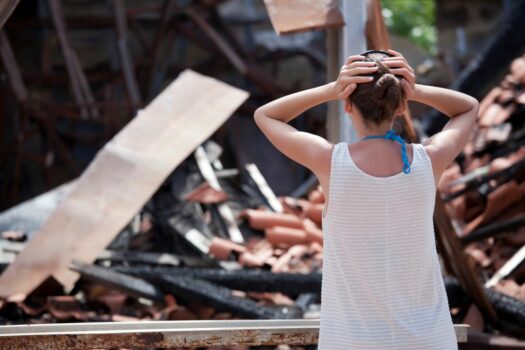The incidents of house fires have kept on decreasing in the US since 1977. According to Statista, there were only 338,000 home structure fires reported in 2021 compared to more than 700,000 in 1977. However, 338,000 is still a large number. These house fires are largely associated with damage and physical health consequences like burns.
However, house fires can leave long-lasting mental and physical health consequences. The impacts on their mental health are often not as immediately visible. Most people do not realize that having survived a house fire can cause PTSD or depression, or how these conditions may manifest physically. Fortunately, there are ways to help yourself recover from the aftermath of a house fire.
The Immediate Impact
When you experience a fire, your immediate reactions will likely be shock and disbelief. You may feel like the world has been turned upside down, or that you've been thrown into an alternate reality. You may also be unable to process what happened in those first moments after being rescued from the burning building.
Shock and denial often follow initial trauma. These emotions help deal with your feelings by pushing them aside until you have time to process them later on. Unfortunately, this can lead people who've experienced house fires down a path toward mental health issues if they don't get help.
Post-Traumatic Stress Disorder (PTSD)
PTSD is usually associated with wildfires. For instance, an NCBI study states that wildlife fire survivors are at a great risk of developing PTSD or depression.
However, even house fires can be traumatic and may lead to PTSD in some individuals. In the case of a house fire, the trauma may result from various reasons. For instance, it can arise due to the immediate danger to one's life, the loss of property, or witnessing harm to others.
Here are some of the common symptoms of PTSD that can occur as a result of a house fire:
- Intrusive thoughts and flashbacks: Individuals with PTSD may repeatedly experience distressing memories or nightmares related to the fire. These intrusive thoughts can be triggered by various cues, such as the smell of smoke or the sound of a fire alarm.
- Avoidance and emotional numbing: People with PTSD often go to great lengths to avoid reminders of the traumatic event. This might include avoiding places, activities, or conversations related to the house fire. They may also feel emotionally numb, detached from others, or have difficulty experiencing positive emotions.
- Negative changes in beliefs and feelings: Those with PTSD may experience a shift in their beliefs about themselves, others, or the world. They may develop a negative outlook, feelings of guilt or shame, and a distorted sense of blame.
Depression and Anxiety
You know the feeling. You wake up in the morning, get out of bed, and begin your day as usual. But then you remember that something happened last night, something terrible and devastating. You were displaced from your home due to a house fire. It means that everything that was once familiar to you has been taken away.
As if this weren't enough, there's also the financial strain caused by rebuilding or moving into another place. To make matters worse, depression can occur after experiencing such trauma because losing all these belongings may be seen as losing part of yourself.
Indirect Impact Through Physical Health Complications
While household fires can have a direct toll on mental health, some people may face indirect consequences. For instance, suppose the fire resulted because of oil. In that case, firefighters will usually use AFFF firefighting foam to suppress it. The Per and Polyfluorinated Substances (PFAS) present in AFFF can seep inside your house. So even when you rebuild it, PFAS will remain.
Due to the exposure to PFAS, you might develop cancer. Moreover, it is associated with liver damage and birth defects. Several studies have proved the link between PFAS and these health conditions.
In fact, many people who have been diagnosed with cancer due to AFFF exposure have even filed firefighter foam lawsuit cases against manufacturers. They allege that the manufacturers knew about these health consequences but failed to warn them.
Coming back to the topic, suppose you develop any such physical health problem. In that case, you would start worrying about your health, leading to isolation and then mental health consequences. Thus, house fires can not only affect your mental condition directly but also indirectly.
Survivor's Guilt
Survivor's guilt is a normal reaction to trauma and it isn't about blame. It's about loss. You may feel that you should have prevented the fire or that someone else should have survived instead of you. You might wonder why you were spared when others weren't, especially if your friends or family members died in the fire.
Survivors' guilt can be described as the feeling of guilt that survivors have for surviving the trauma when others did not. It can also manifest itself as feelings of inadequacy, shame, anger, and resentment toward oneself or others who survived.
This is seen across any person who has experienced a fire, be it in the house, wildfire, or even self-immolation. This has been observed in the women survivors of self-immolation in the Kurdish regions of Iran. According to a study in the Frontiers Journal, survivors felt guilty and regretful for doing such actions.
The same has been observed among people who survived or lost someone in wildfires. The survivors usually lose someone or have to relocate during wildfires, leading to guilt. And the same is the case with the survivors of house fires, too. Regardless of the type of fire, survivors are usually susceptible to guilt.
Social Isolation and Stigmatization
Stigma is one of the most common and damaging consequences of a fire. It can lead to social isolation, which in turn can affect your recovery. If you are affected by stigma, it's important to know that there are ways to overcome it:
- Reach out to others who have been through similar experiences. They may be able to offer advice or support that you need.
- Talk about how you feel with family members or friends if they're willing. They might have helpful insights into how best to handle your situation at home, school, and work.
- Consider joining a support group where other people who have been through house fires get together regularly.
Conclusion
We hope that this article has given you a better understanding of the mental health consequences of house fires. We also want to emphasize that recovery is possible, and there are many resources available to help survivors overcome these challenges. The most important thing is for you or someone close who has been affected by a house fire to reach out for support. You can seek support from family members, friends, or other survivors in similar situations.
Follow me down the rabbit hole!
I'm Alice and I live with a dizzying assortment of invisible disabilities, including ADHD and fibromyalgia. I write to raise awareness and end the stigma surrounding mental and chronic illnesses of all kinds.








